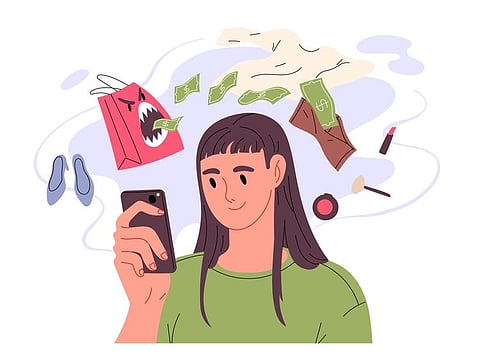Why do we shop more when we are hungry or moody? Spending psychology explained
Behavioural economists detail how ‘projection bias’ could be destroying your finances

Dubai: Emotions and moods are widely known to have a way of influencing our spending behavior. But ever wondered why that is? Experts explain that we end up doing so because we often fall victims to what is known as ‘projection bias’.
“The ‘projection bias’ results in irrational spending choices especially when you’re shopping,” explained Matthew Griffin, a UK-based behavioural economist who studies the effects of psychological, emotional and social biases that affect spending decisions of individuals.
“It causes you to believe that however you are feeling in the moment is how you will still feel later. So when shopping on an empty stomach, you tend to buy more food than is needed, and you may also end up buying unnecessary food to satiate hunger that may not be even there in future.”
How does ‘projection bias’ affect your finances?
When it comes to planning your routine finances, Griffin further explained how this could lead to problems in gauging upcoming expenses correctly, and make incorrect assumptions about the money you might need to set aside, which may even go as far as affecting your future investments.
“The ‘projection bias’ undeniably does more than just fill your grocery carts with food you’ll never eat. It can also cause you to make even bigger financial mistakes, and the inability to project your future preferences can ruin your finances, and even your investments” Griffin added.
“Whether you're investing in real estate or investing in a pension, this bias can result in a costly mistake like deciding to take your nest egg and locking it in illiquid investments even when you're financially stable. What would happen if you were to lose your job or need quick cash?”
When the bias results in you not saving enough
Global youth surveys conducted by multiple data analytics firms indicated that every third person worldwide in the 22-32 age bracket hesitated to save money for retirement because they wanted to enjoy their money while young. Here’s how ‘projection bias’ plays into this characteristic.
“Assuming good health, stable employment and unrealistically hoping to continue working forever, while not bothering to save money for a rainy day or for retirement, because today’s stability is projected into the future, is a common symptom of ‘projection bias’,” noted Griffin.
“This is one reason why pessimists tend to be better savers than optimists. Pessimists expect things to go wrong, and they plan accordingly. So it’s a good idea to embrace your financial pessimism and think through all the potential ways circumstances could throw a wrench in your money goals.”
Can we predict future emotions when making budgets?
But since we can’t always predict our future emotions while making our budgets, how do we prevent such emotion-driven lapses in spending or saving from hampering expenses that are bound to come up later in the month or years even?
“The best way to overcome these emotional spending scenarios is to create a budget before each month that reflects your character, and make it at a scheduled time when you are thinking clearly about your money goals,” said Dubai-based money coach Mirin Raul.
“That way, you have something to guide you and your spending, whether you feel good or bad. You’ll be focused on your goals, and you’ll be more likely to reach them because you, not your emotions, control your spending.”
Tips to rein-in emotional spending
Reining in emotional spending can be as simple as removing your credit cards from your wallet, including store credit cards. You could take it a step further and delete your credit cards from your virtual wallet as well. Here are three more simple and popular tips from Raul and Griffin: 1. Limit your spending to cash when shopping as a stringent budget keeps you in check 2. Give your bank accounts labels such as "home down payment" or "vacation fund” as this habit will inherently make you less apt to dip into it for emotional spending. 3. Wait 24 hours before making an unplanned purchase, as it is proven fact that unnecessary purchases may lose their luster a few hours later.
Verdict: You can avoid emotional spending by having a plan
While such biases are incredibly common, they don't have to destroy your financial security. Raul advises that “understanding how your brain leads you astray is the first step in avoiding your most money-wasting errors in logic.”
“The trick to keeping ‘projection bias’ from destroying your finances is remembering that the future will not be exactly like the present,” she added. “So it pays to be flexible in your plans for the future, and a little pessimistic about what you can expect.”
In other words, accounting for this bias can be financially rewarding when it comes to understanding and predicting people’s behavior, including your own.
Sign up for the Daily Briefing
Get the latest news and updates straight to your inbox


